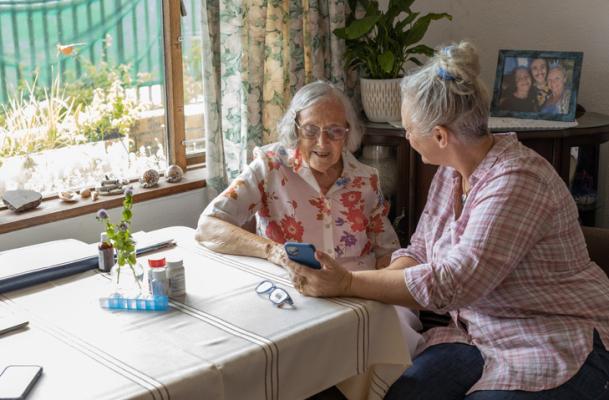
Royal Philips has announced the debut of a comprehensive approach to telehealth with Philips Virtual Care Management. The solution’s condition-specific protocols now include heart disease and hypertension, as well as other chronic conditions. Photo credit: Getty Images
March 28, 2023 — Royal Philips has announced its debut of Philips Virtual Care Management, a comprehensive approach to telehealth with a portfolio of flexible solutions and services that aims to improve patient engagement and health outcomes while lowering cost of care and enabling workflow efficiencies. In releasing a statement on the technology, the company offered that Philips Virtual Care Management can help reduce pressure on hospital staff by decreasing emergency department visits, and reducing the cost of care through better management of chronic disease [1][2].
The announcement coincided with Philips’ participation in ViVE 2023, coordinated by CHIME + HLTH, being held March 26-29 in Nashville (TN), which drew senior digital health leaders focus on the business of health care systems. During ViVE 2023, Philips CEO Roy Jakobs presented “See Beyond – How Innovation Addresses the Urgent Need for Better, More Efficient Care,” which brought attention to the need for technology to ease the burden of healthcare systems. His session promoted the value of creating “a live, actionable view of the patient through diagnostic data, digital images and vital measurements, supported by insights, to help care providers significantly improve care.”
Philips Virtual Care Management’s condition-specific protocols now include hypertension and heart disease, along with other chronic conditions, according to the company, which noted that for patients, the opportunity to understand and take proactive control of their health can potentially lead to improved outcomes.
In a statement announcing the health technology solution, the company noted that every year, chronic condition management represents 90% of healthcare expenditures in the USA [3].
“Virtual care is paving the way to meaningfully reduce the cost of care through fewer hospitalizations and emergency department visits,” said Nick Wilson, General Manager, Ambulatory Virtual Care at Philips, who is also presenting during ViVE 2023. Wilson added, “Care providers and health systems today are often short on time and resources, accelerating the need to find new ways to gain visibility into patients’ health amid an overwhelming variety of options. For patients, the opportunity to understand and take proactive control of their health can potentially lead to improved outcomes.”
According to Philips, these protocols combine with connected devices and engagement tools on a secure, interoperable cloud-based platform to deliver rich data and actionable insights that enable timely intervention and workflow efficiencies. Licensed clinical professionals offer monitoring and personalized health coaching; and Philips’ expert-led professional services round out the all-inclusive offering to help customers plan, customize, implement, activate and sustain each program.
The announcement reported that recent studies using Philips Virtual Care Management products and services demonstrated the following results:
- Patients saw a 38% average reduction in emergency department visits [1][2]
- Patients experienced an average HbA1c, or blood glucose, reduction of 3.06% [1][4]
- Results suggest potential savings of USD 3,086 annual claims per patient or member [1][2]
- Results suggest fewer 30- and 90-day hospitalizations compared to usual care [1][5]
The company reported that Philips’ advanced virtual care program goes beyond traditional remote patient management with scalable solutions and services that help to foster strong patient engagement, empower healthier behaviors, expand access to care, improve outcomes, and lower healthcare costs. Philips Virtual Care Management is not currently available outside the USA.
For more information: https://www.usa.philips.com
References:
[1] Magee MF, Baker KM, Fernandez SJ, et al. Redesigning ambulatory care management for uncontrolled type 2 diabetes: a prospective cohort study of the impact of a Boot Camp model on outcomes. BMJ Open Diabetes Res Care. 2019;7(1):e000731. Published 2019 Nov 13. doi:10.1136/bmjdrc-2019-000731.
[2] A Diabetes Care Management Program for uncontrolled type 2 diabetes in a predominantly African American population amortized over the study cohort due to reduced risk of all factors hospitalization after 90 days compared to usual care.
[3] Remote patient monitoring system market size, share and trends analysis report by product (vital sign monitors, specialized monitors), by end use, by application, and segment forecasts, 2022-2030. Grand View Research. Accessed November 16, 2022. https://www.grandviewresearch.com/industry-analysis/remote-patient-monitoring-devices-market.
[4] Following a 90-day diabetes care management program in 366 subjects with type 2 diabetes, average baseline HbA1c: 11.2%.
[5] 30 day incidence risk ratio = Intervention (0.21, 95%CI 0.07 to 0.60; p=0.003) vs control (1.14, 95%CI 0.47 to 2.75; p=0.77); between group (p=0.02). 90 day IIR = intervention (0.23, 95%CI 0.11 to 0.50, p<0.001) vs. control (1.58, 95%CI 0.750 to 3.33; p=0.23); between group (P<0.001).


 November 14, 2025
November 14, 2025 









